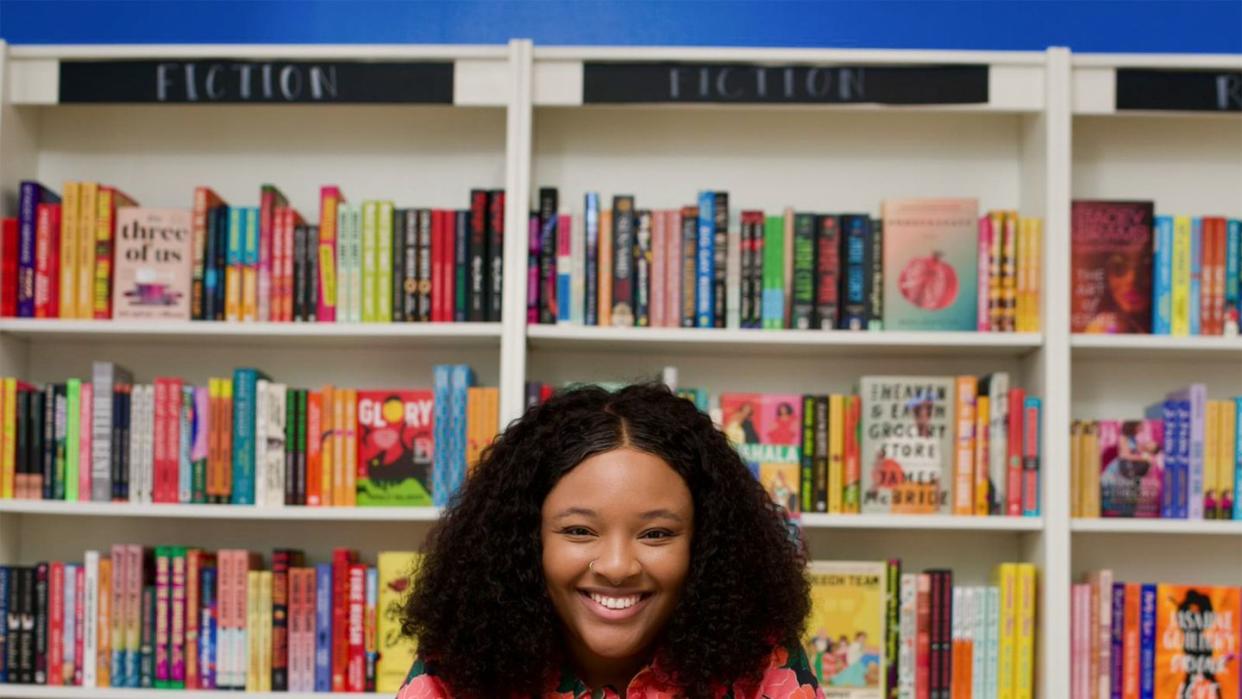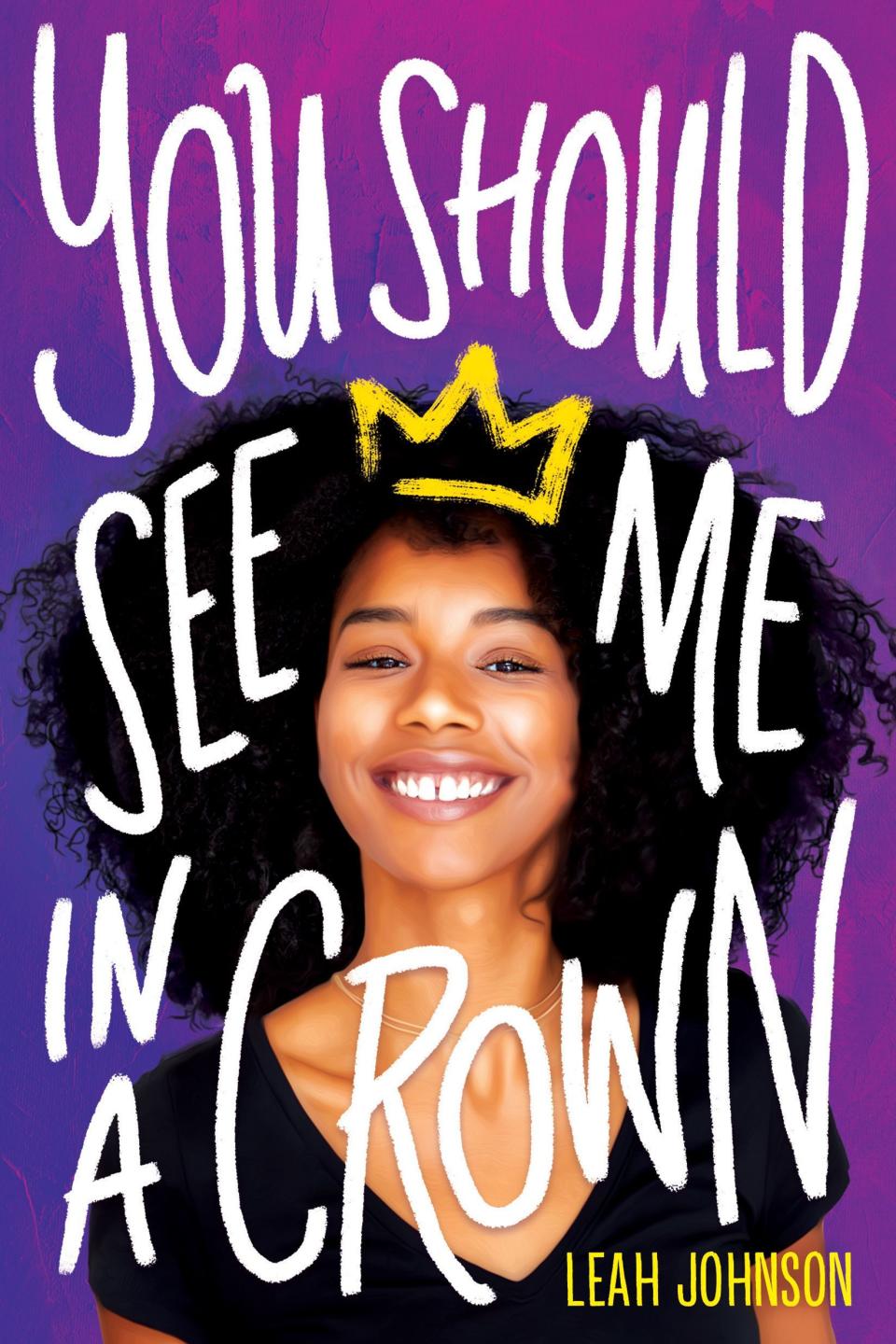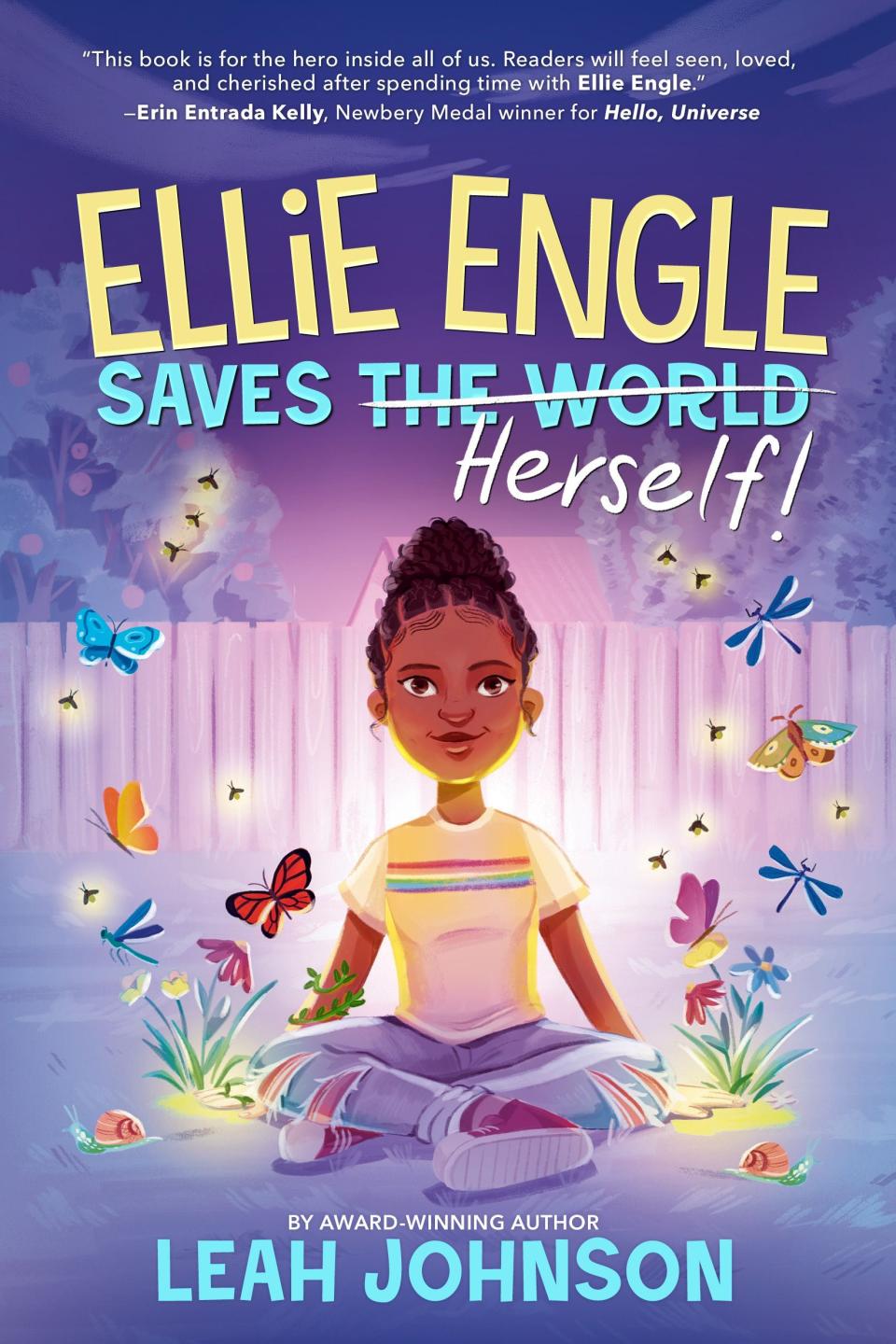The Author Fighting Back Against Book Bans

"Hearst Magazines and Yahoo may earn commission or revenue on some items through these links."
“The work doesn't stop because the work can't stop,” said Leah Johnson, bookseller, professor, and author of multiple award-winning books. As we spoke, she was working on a mailing books for a preorder campaign for EK Johnston, had a class to teach in about three hours, and the week prior, she’d had another project due, a rom-com co-written with her friend, George M. Johnson. “Not only because there are people who are depending on me to keep going, but also because this is my life's work,” Johnson continued.
Following a book tour that spanned eight cities in ten days for her middle-grade book Ellie Engle Saves Herself, Johnson announced a new dimension of her life’s work: Loudmouth Books, an Indianapolis-based, queer, Black, woman-owned independent bookstore and community space that uplifts banned books and highlights the work of marginalized writers.
Book bans and challenges have gone hand-in-hand with legislative attacks on the rights and well-being of LGBTQ+ people, including LGBTQ+ youth. The majority of these bans and challenges target books that feature LGBTQ+ characters or content, cover race and racism in American history, or include sex education, according to PEN America. One of Johnson’s own books, the inaugural Reese’s Book Club Young Adult pick and a 2021 Stonewall Honor Book, You Should See Me in a Crown, was among over 50 books placed under investigation by the Oklahoma Attorney General.
Loudmouth Books opened in September 2023 to an overwhelmingly positive community response, Johnson said. The magic of Johnson's writing—finding one's self in community, boundless heart, a vibrant voice—echoes through Loudmouth, too. “We're trying to build something here that's sustainable, whether it's sustainable here at Loudmouth or sustainable industry wide,” she added. “My interests are in making it possible for queer, BIPOC authors to continue to do this work and do it in a way that offers them some measure of freedom, of stability—the same way we have offered that to cis, straight white folks for decades.”
Johnson spoke to Esquire about Loudmouth, the connection between her roles as author and bookseller, and more. This interview has been edited for length and clarity.
ESQUIRE: You’ve said that Loudmouth was a direct response to this year’s legislative session. When did you first imagine opening a bookstore?
LEAH JOHNSON: Like every nerd, I always had this vague dream of opening a bookstore. But it wasn't something that felt tangible until this year. The political landscape in the state felt like it necessitated an urgent response. The more practical reality is that I did not have the means to do it until this year. As a result of getting a couple really substantial book deals in quick succession, I had the capital to do it. I also felt like I was at a place in my career where, for the first time since I started writing, if I didn't put out a book every three and a half minutes, I would be okay.

You Should See Me in a Crown
bookshop.org
$10.22
The reality is, the only people who win when we don't tell the truth about our economic conditions are people in positions of power, who benefit from us being silent and ashamed. I was able to do this because I have a great deal of financial privilege now that I did not have four years ago. I work very hard, but that's not a result exclusively of hard work. It's a result of luck. It's a result of timing. It's the result of writing the right book in the right moment. My ability to be in this position comes at a cost to a lot of other folks whose books were equally as worthy, if not more so than mine, of getting the praise and recognition and money. I think it's worth noting that this is an endeavor that was made possible by a lot of financial privilege.
How do you move between identities and roles? I’m curious about how your role as an author has informed your work as a bookseller.
All of my work bleeds into each other. My work as an educator, my work as a writer, my work as a bookseller—all of them are linked, not only because my politics and my positionality are going to follow me into every room that I enter. But also because I think I would not be in this position—I literally would not be in this position if I weren't a writer—but I am here because I believe so much in the work not only that I do as a writer, but the work that my friends do. Watching their work be further marginalized, watching them be made to be afraid or ashamed of the work that they do, the bookstore felt like a direct response to that.
I know that most of us have been sitting on our hands, wondering what it is we can do to make any sort of tangible difference, because the only thing we can control is the writing of the book. We can't control how it's publicized. We can't control how it's marketed. There is a certain measure of powerlessness. I think that this was an attempt not only for me to take back my power as a writer, but also do something with and for the community that got me here—the other queer and BIPOC writers who bolstered me in moments when I didn't see a way forward. Now there's always going to be home for their books; there's always going to be a home for them to do events. The writing influences the bookstore, the bookstore influences the writing, the teaching influences the writing. All of it is a part of a larger project for me.
How does the feeling of community, or the priority of community, shape Loudmouth?
One of the things that was a driving force for me when I decided to open a bookstore was modeling some of our programming after other community-oriented bookstores that had appealed to similar communities. One of those bookstores is Semicolon in Chicago, which recently switched to a nonprofit model so that they could lean even further into their community-oriented programming. One of the things that they did over the course of the pandemic, which I thought was really fascinating, was give books away. They let students from Chicago public schools come in and take whatever book they wanted, free of charge. I thought there was something so empowering about that. We’re taking the air out of capitalism. We're giving the power back into the hands of the people we do this for, and saying, yes, books are a luxury item, but that does not mean that they should be prohibitively expensive. It doesn't mean that they shouldn't be accessible to you. That was a huge inspiration for me.
I did an interview recently, and the guy brought up the clear the shelves initiative. He's like, "It doesn't sound like a very good business practice." Well, first of all, it's not. I'm not here because I'm interested in being a big time businesswoman. I'm here because I believe in community. I'm here because I believe in the work that we do. I believe that if I had been offered spaces where I could feel safe and at home and seen as a child, then I wouldn't have felt like I had to run away to New York to be my fullest self. Third places are inherently an anti-capitalist idea. In a city where we can't even sit on benches at bus stops anymore because they don't want houseless people to sleep on them, it feels like the very least we can do in our business practices is integrate a culture of third places.
How are you all deciding what to carry in the store—how does that process work?
It was just me for a long time. I do all the ordering for the store, and most of the labor—getting the store off the ground was me exclusively, until about a month before we opened, when I was able to hire a manager. His name's Kelly Stacy; he's amazing. He had come from a bookselling background in New York, [and] used to work for Greenlight and Word, and moved back here with his wife Ashley C. Ford a couple years ago, so it was a perfect storm of conditions. I was able to bring Kelly in, and that was when we were really able to move quickly, when it wasn't just one body in the space.

bookshop.org
$17.66
I started with a spreadsheet back in the spring. If I can only carry 100 books, [which] 100 books are those going to be? It's going to be my favorites. It's going to be the books that I know my friends love to recommend. It's going to be the books that I read when I was a kid. It's going to be the frontlist title that I know if we don't carry it, someone's going to show up and start a riot at our front door. The organizing principle for the entire store is what books are for, by, and about marginalized people? What books are not going to be carried at Barnes and Noble because the author has a sales track that maybe is not as favorable as your Rebecca Yarros or your Emily Henrys? How can we make this a store full of books that you wouldn't find anywhere else?
This is one of those things that indie booksellers talk about all the time: how we can do in a bookstore what no algorithm can do. If you're not in this business because you love books and you love people, you're in it because you want to go to space on vanity missions, then of course you don't care if the price of books is so low that nobody else can match it. So eventually, every other bookseller in the world is going to close, and then the only option is to buy books from you all, so you all get to decide what is worthwhile and what's not.
That's what all of us are trying to fight against. But it is an uphill battle. I'm under no delusion that books are not a luxury. They’re a luxury for a lot of people. For a lot of folks, when they think about buying books, they're not thinking about how they can source them ethically. They're thinking about, okay, how can I get a book, and also, how can I eat dinner tonight? Every time I talk about the importance of indie bookstores, I try to acknowledge that there are avenues outside of the behemoth that shall not be named. And we just have to be ready to pursue those, or we have to be ready to explore those options.
I was thinking about your first Instagram post about the store, where you said that Loudmouth is here to proclaim that you can’t ban queer joy, you can’t ban Black joy, you can’t stop people from telling their stories. I wanted to ask about opening the store in the context of book bans and legislative attacks, because I thought that caption captured so much.
I think the thing to remember is that book bans aren't about books themselves. They're about a removal of queer people from public life. Politicians want queer people, especially queer young people, to be so ashamed and so afraid of who they are and what they are becoming that they hide away. But there is no eliminating queer stories. There is no eliminating Black stories. We have been telling stories since it was illegal for us to learn how to read and write. You're not going to keep us from doing the work of our ancestors, which is to tell stories, which is to use the oral storytelling tradition to bridge gaps and community, to find each other in darkness.
For me, Loudmouth is and always will be an assertion that no matter how hard you try to eliminate us, no matter how hard you try to silence us, we're not going anywhere, because we've always been here and we always will be here.
I teach a class called One Direction Will Save the World, which is about the politics of fandom and about how fan culture can be an organizing principle for how we see ourselves but also how we approach politics. It's a cultural criticism class at its core, but also it's a class that is intended to generate some discussion about who we are and how we move through the world. Just yesterday, our lecture was on the 4 I’s of Oppression. The first level of 4 I’s of Oppression is ideological oppression. The first thing that any dominant group has to do is establish a narrative of power. So it starts with telling people over and over again, who is valuable and who's not, who deserves life, liberty, and the pursuit of happiness and who doesn't. That ideology bleeds into the institutions that govern us, which is education, which is policy, which is health care. Everything from the institutions that govern us to then intrapersonal oppression, so the way we play out violence against each other, to internalized oppression, the way we play out violence against ourselves due to the way that we have internalized these ideas from the dominant group—all of this starts with an idea.
That idea is if I can teach somebody that who they are is something to be ashamed of, if I can teach people who are unlike them that who they are is different and something to be feared, then I can control them. All of this is about control. If it was just about books, it wouldn't feel like life or death. But this isn't [just] about books and it never has been. This is a fight for our lives, and the battleground on which it's fought is language.
What have we not talked about that you think it’s important for people to know?
This is really really hard work. Writing is hard work. Feeling as though you're constantly being policed both in your work and in your body is really hard work. I would just be remiss if I didn't acknowledge that this does come at great sacrifice. I don't say that because I'm martyring myself, because I'm not. I get to do the coolest thing in the world, which is sell books and write books. But it is to say that even in reclaiming some measure of power, I, a vulnerable person, have to increase my level of vulnerability by being more visible to people who would mean me harm, and also by not getting time to rest and take care of myself in the way that I probably should. It bears mentioning that even when you are a marginalized person reclaiming your power, that power is wrested from these institutions in a way that is not always super life-giving.
You Might Also Like

